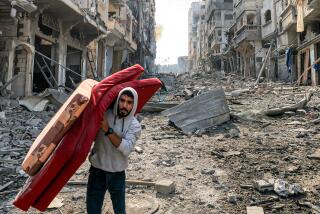A Lifeline to Grab in Iraq
The Bush administration is making two important moves to blunt the violence and anger that threaten the U.S. occupation and all of Iraq. The first is relying on Iranian diplomats to help end the uprising of Shiite rebel cleric Muqtada Sadr. The second, and more significant, is turning back to the United Nations.
Almost two years ago, President Bush told the U.N. it would become “irrelevant” if the Security Council did not pass a resolution approving war with Iraq. But in his press conference Tuesday, Bush declared: “We’re working closely with the United Nations envoy, Lakhdar Brahimi ... to determine the exact form of the government that will receive sovereignty on June 30.” Now Bush must grab the lifeline Brahimi threw him Wednesday for internationalizing the occupation.
U.N. Secretary-General Kofi Annan is understandably cautious about reentering Iraq, saying Tuesday that security was the “major constraint.” But Brahimi’s proposals offer a strategy that the U.S. otherwise lacks.
Brahimi, a former Algerian foreign minister, wants to create a new interim government of technocrats untainted by the occupation. Members would largely be chosen by the U.N.
Perhaps Brahimi’s most compelling suggestion is to hold a national conference in July on the model of Afghanistan’s loya jirga to create a consultative assembly that would advise any interim government. Only through continuously pushing the Shiites, Sunnis and Kurds to hammer out their differences in a political sphere can there be an end to the violence that is plaguing Iraq.
Both the U.S. and U.N. will have to persuade the leading Shiite cleric, Grand Ayatollah Ali Sistani, to sign on. Iran’s diplomats can also influence Sistani, who has close ties to Tehran and grew up in the Iranian city of Mashhad. If Sistani goes along with a U.N. plan, the resistance led by Sadr should be further blunted, though predicting cause and effect in Iraq is a parlous enterprise.
Politics is one thing and military obligations are another, and much harder to shed. The Pentagon’s dispatching Wednesday of Maj. Gen. David H. Petraeus -- who has successfully trained 18,000 mostly Kurdish recruits in northern Iraq -- to eastern Iraq, where officers are now being schooled, suggests that the administration is starting to take the creation of a reliable Iraqi army more seriously.
The doubt that hangs over all of this potential success is security. The U.N. presence in Iraq has been minimal since the Aug. 19 truck bombing that demolished the U.N. headquarters in Iraq, killing envoy Sergio Vieira de Mello of Brazil and 21 other people. Again, a strong partnership between the U.N. and Sistani could establish zones of relative safety. The U.S. must also demonstrate to Iraqis that they will run their own country rather than being ordered around by a puppet Governing Council backed by American military power.
Brahimi’s last-ditch effort at creating an Iraqi political structure offers the possibility that the June 30 turnover will be more than a hollow ceremony. Even such faintly good news is a rarity to be embraced.
More to Read
Sign up for Essential California
The most important California stories and recommendations in your inbox every morning.
You may occasionally receive promotional content from the Los Angeles Times.










